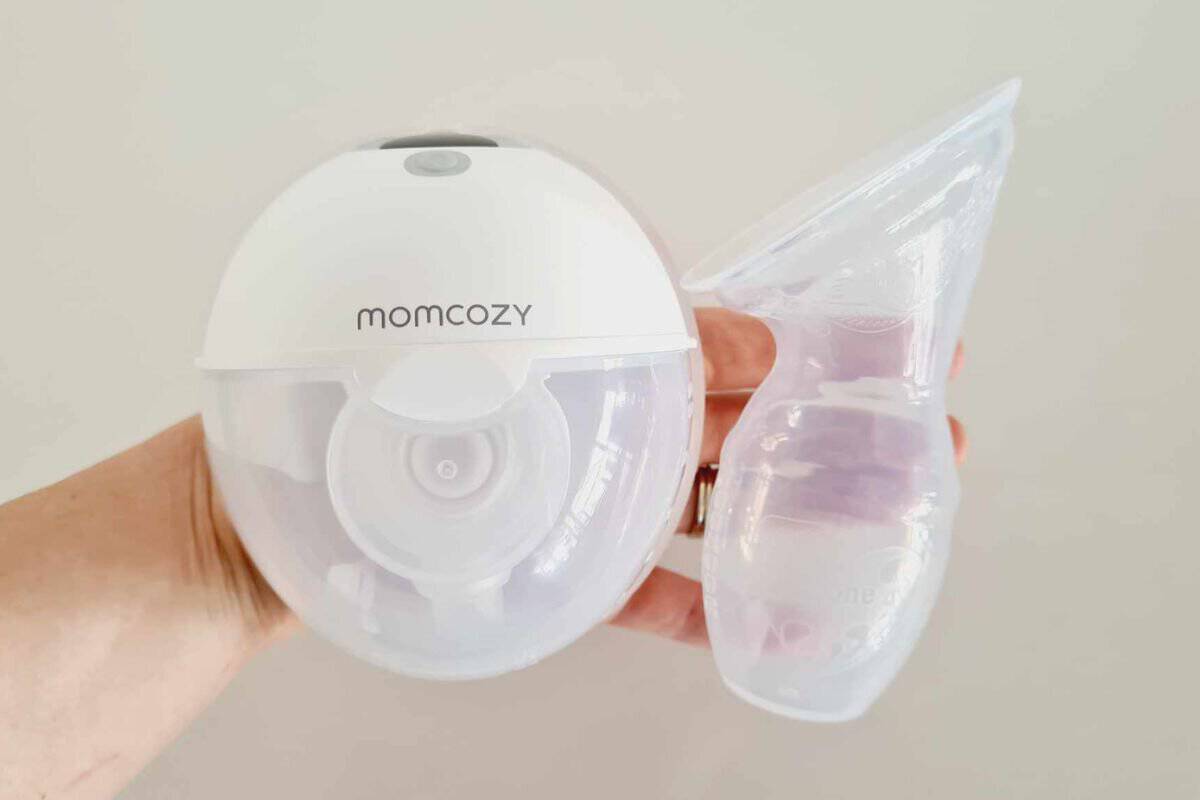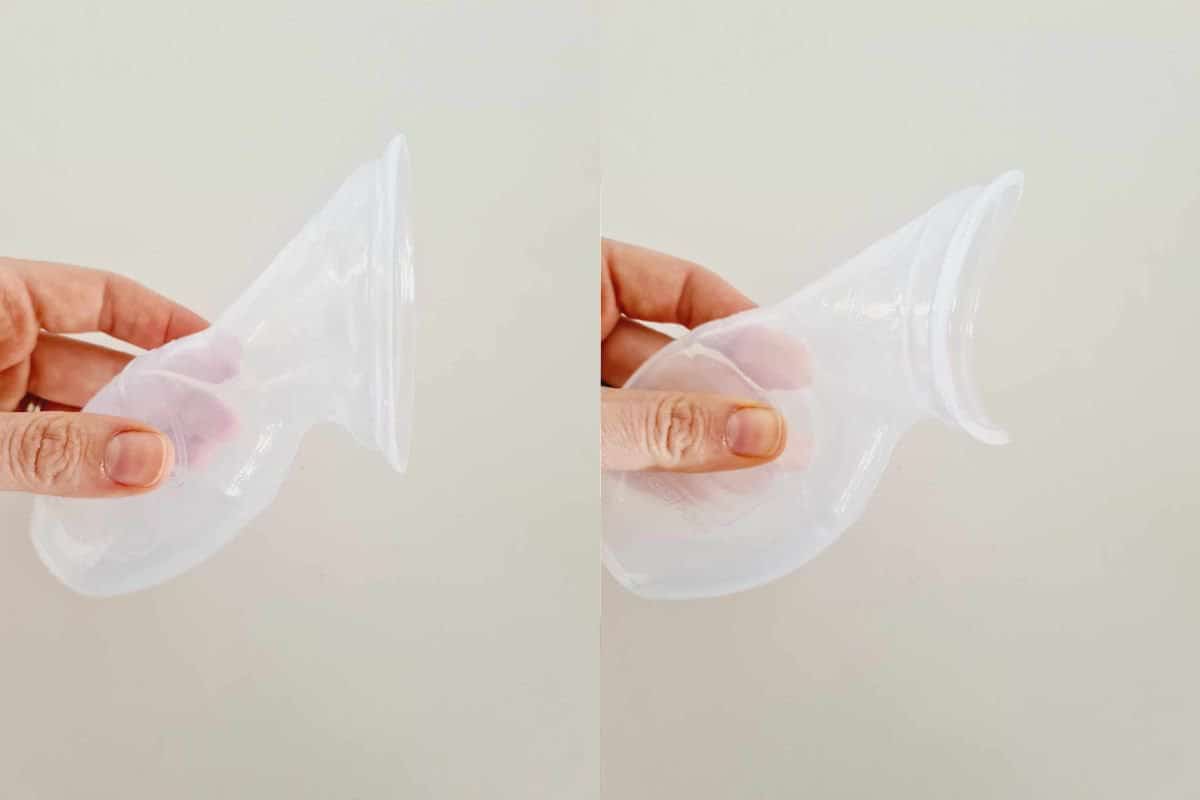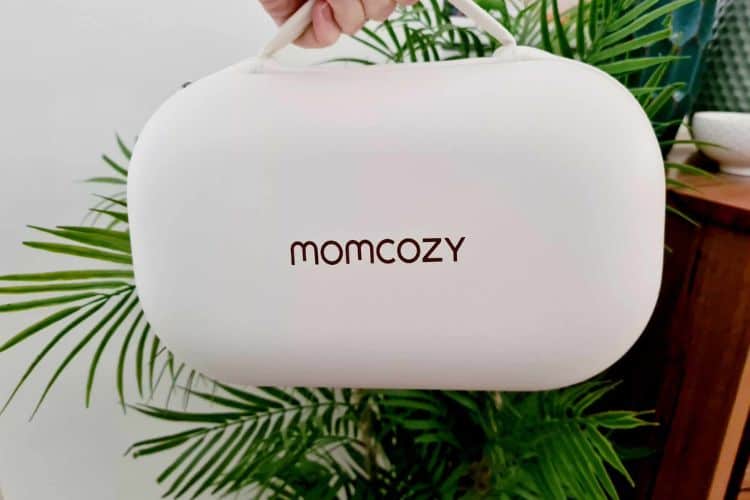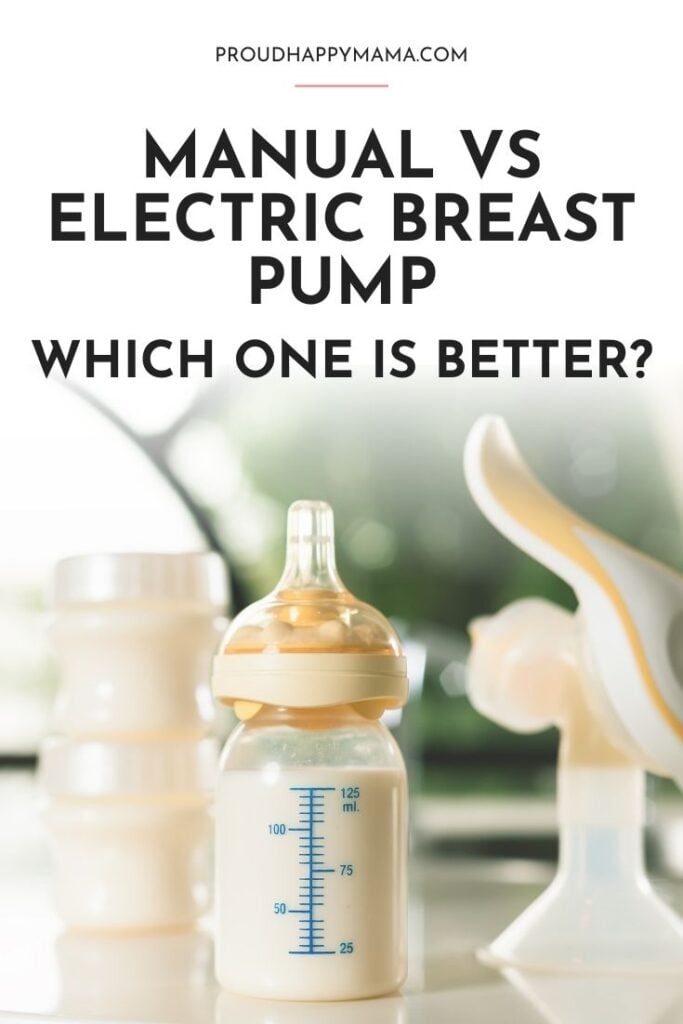Manual Vs Electric Breast Pump
Manual and electric breast pumps are two different types of devices used by breastfeeding mothers to express and store breast milk.
A manual breast pump is a handheld device that does not require electricity or batteries to operate. Instead, it relies on the user’s manual effort to create suction and extract milk.
Electric breast pumps, on the other hand, automate the process by using an electric motor to create suction, making them more efficient and convenient for many mothers.
I think both manual and electrical breast pumps can be advantageous, but deciding whether a manual vs electric breast pump is best for you will come done to your individual preferences and needs.
So, to help you understand the differences between manual and electric breast pumps, including their features, pros, and cons, I put together this guide so you can figure out which one is best for you.
And if you love this manual pump vs electric pump comparisons guide, make sure to check out my guides on the best electric breast pumps and best manual breast pumps.

Manual Vs Electric Breast Pump
If you are trying to decide whether a manual breast pump or an electrical breast pump will be better for you, here are a few important factors that I think you should consider.

Efficiency
There is a big difference between exclusively pumping, pumping part time, and pumping occasionally.
For me, if you are pumping more than a few times a week, I would recommend investing in an electric pump.
Whilst you can use a manual breast pump daily, like a Haakaa, I feel it’s important to take into consideration that manual pumps are generally less efficient and slower compared to electric pumps. They require more effort and time to express the same amount of milk. Afterall, they are powered by you manually pumping or squeezing!
Electric pumps, on the other hand, are powered by an electric motor that makes them faster and more efficient. They can express milk from both breasts simultaneously (double pumping) and mimic a baby’s sucking pattern.
Ideally, manual pumps are suitable for occasional use or when you need to express milk infrequently and electric pumps are ideal for mothers who plan to pump regularly, such as working mothers who need to pump multiple times a day.
You may want to check out this guide on how often should I be pumping.
Budget
You won’t be surprised to learn that a manual breast pump is going to be a lot cheaper than an electric breast pump.
That said there is a vast difference in the affordability of electrical breast pumps from budget friendly wearable breast pumps like the BellaBaby W40 and Mommed S21 to high end pumps such as Elvie pump Vs Willow.
And if budget is a major concern, you can also look to buy an electric pump second hand, though I do recommend if you do this to replace all the parts that come in contact with breast milk such as the flanges and valves for hygiene and performance.
There is also quite a few places where you can hire hospital grade electric breast pumps such as the Medela Symphony. I recommend checking if this is available in your local community.
In some cases, you can even get your breast pump through your health insurance. I recommend you check with your health insurance provider to see what is covered for you. They will likely have a list of approved models you can choose from.
Another factor to consider though, is that with an electrical breast pump, especially a double electric breast pump, you will have ongoing maintenance costs with the replacement of breast pump parts such flanges, breast shield, valves, tubing, and diaphragms, as well as the ongoing cost of charging the battery.
What you are really paying for though, is for your time and the convivence of the electric pump. If you’re budget can suit, and you plan to regularly pump, then I think that and electrical pump is worth the investment. However, if you are really strapped for cash, then a manual pump is still a great option, or alternatively avoid using a pump altogether and opt for hand expression.
Portability
Portability is where a manual pump shines!
Manual pumps are lightweight and highly portable. I love that they do not require an electrical source which I think makes them a fantastic option when you are travelling to foreign countries or remote locations and may not have easy access to a power source.
Traditionally, electric pumps can be less portable due to their size and need for power. However, there are breast pumps that have been designed specifically for portability and come with rechargeable batteries. One of my favorites is the all-in-one Momcozy M5, that also comes with a gorgeous hard shell carry case!

Discretion
When it comes to a discrete breast pump, I personally like a wearable breast pump, that is comfortable, lightweight, and quiet in operation, like Elvie and Momcozy brands.
Although a manual pump is virtually silent, you still need your hand close to your breast to manually activate the pump.
The downside of an electrical pump is that they can be loud. In many cases you will have an obvious humming noise. Also depending on the type of pump you buy, you may be tethered to a power source and have the flanges and collection bottles sticking out from your bra, which is far from discrete. Hence, for discretion I prefer a wearable breast pump that has no cords or tubing and can fit snuggly within your pumping bra.
I should note, there is also a newer range of passive breast pumps on the market, such as Elvie Catch and Elvie Curve, that fall somewhat into the manual breast pump range. They aren’t manual in terms of a hand pump requiring you to pump, but they also don’t require any electricity to operate. Instead, they sit within your bra and rely just on natural suction to create a seal and initiate letdown. They then catch the milk flow.
I think the passive breast pumps offer a lot of value in terms of discretion as their is no manual pumping action required and also no noise from an electric breast pump. But obviously, they are not as efficient.
Cleaning and Maintenance
Electric pumps have more components that need cleaning, and generally require more maintenance than manual breast pumps, especially if you’re opting for a double breast pump.
They typically come with the collection container, flanges, valves, diaphragms, connectors, and tubing that can come in contact with the breast milk and thus need to be cleaned before each use and regularly replaced depending on the manufacturers recommendations.
You can reduce some of the cleaning requirements by opting for a closed system electric pump which means fewer parts come in contact with breast milk.
I think it’s important to note though, that your manual breast pump still needs to be cleaned and maintained. You may even find that you’ll need to replace your entire manual breast pump after a few months of heavy use.
Whilst cleaning and maintenance may not be a major consideration, it is something to keep in mind, especially as it can lead to an additional cost.
FAQS
There is no definitive answer to this question as it depends on your specific needs and preferences. Manual breast pumps are more affordable, portable, and simple to use, making them suitable for occasional use or when you need a backup. Electric breast pumps are faster, more efficient, and convenient for regular or extended pumping sessions. The “better” option depends on your circumstances and how you plan to use the pump.
Advantages of using a manual breast pump include:
– Portability: Manual pumps are compact and do not require electricity, making them ideal for travel or on-the-go use.
– Affordability: They are generally more budget-friendly.
– Quiet Operation: Manual pumps operate silently, providing discretion.
– Control: Users have precise control over suction intensity and rhythm.
– Simplicity: They are easy to assemble, use, and clean due to their simple design.
Generally, electric pumps are more efficient and can extract larger volumes of milk in a shorter time compared to manual pumps. However, the amount of milk you can express depends on several factors, including your milk supply, your comfort while pumping, and the type of pump you are using. Some mothers may find they can express enough milk with a manual pump, while others may prefer the efficiency of an electric pump.
Whether you need an electric breast pump depends on your circumstances. You may want an electric pump if you plan to pump regularly, such as for work or to maintain milk supply, if efficiency and speed are important to you, you have difficulty with manual pumping due to hand strength or dexterity issues, or if you have a high milk supply and need to express larger volumes of milk quickly.
However, if you only need to pump occasionally, travel frequently, or prefer a more budget-friendly option, a manual breast pump can be a suitable choice. Many mothers find it beneficial to have both types of pumps to cater to different situations.
Watch The Video
Prefer to see an electric vs manual pump live in action? Then check out my manual breast pump vs electric breast pump video!
Related Posts
- How To Choose A Breast Pump
- Best Breast Pumps For Twins
- Best Breast Pumps For Low Milk Supply
- Best Portable Breast Pumps For Travel
- Breastfeeding Tips For New Moms
Final Thoughts on Electric Breast Pump vs Manual Breast Pump
I think that both electric and manual breast pumps have their place in the breast pump market. However, the choice between an electric breast pump and a manual breast pump comes down to your individual needs, preferences, and lifestyle.
If you’re looking for an occasional breast pump, that is simple to use, highly portable, and affordable, then I think a manual breast pump could be a great fit.
If you’re going to be pumping on a regular basis, then I highly recommend investing in an electrical breast pump for their efficiency, speed, and overall convivence.
You may even find it beneficial to have both types on hand! An electric pump for regular or heavy-duty pumping and the manual pump for convenience and travel.
Ultimately, the right breast pump for you will depend on your lifestyle, how often you plan to pump, your budget, and your personal preferences regarding ease of use and cleaning.

